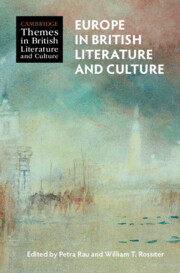Book contents
- Europe in British Literature and Culture
- Cambridge Themes in British Literature and Culture
- Europe in British Literature and Culture
- Copyright page
- Contents
- Illustrations
- Contributors
- General Editor’s Preface
- Acknowledgements
- Introduction
- Part I Zones of Influence
- Part II Pan-European Moods and Movements
- Part III Cultural Transfers
- Part IV Anxious Neighbourhoods, Uncertain Futures
- Chapter 21 Blockade Communications
- Chapter 22 Britain as the ‘Asylum of Nations’
- Chapter 23 Great Games
- Chapter 24 Border Crises
- Index
Chapter 23 - Great Games
Diplomacy and Espionage in British Fiction
from Part IV - Anxious Neighbourhoods, Uncertain Futures
Published online by Cambridge University Press: 06 June 2024
- Europe in British Literature and Culture
- Cambridge Themes in British Literature and Culture
- Europe in British Literature and Culture
- Copyright page
- Contents
- Illustrations
- Contributors
- General Editor’s Preface
- Acknowledgements
- Introduction
- Part I Zones of Influence
- Part II Pan-European Moods and Movements
- Part III Cultural Transfers
- Part IV Anxious Neighbourhoods, Uncertain Futures
- Chapter 21 Blockade Communications
- Chapter 22 Britain as the ‘Asylum of Nations’
- Chapter 23 Great Games
- Chapter 24 Border Crises
- Index
Summary
From the nineteenth century to the twenty-first century, British espionage fiction documents relations between the UK and its European neighbours. In many countries, spying was conducted under the auspices of the Foreign Office, albeit at arm’s length. From the 1920s until 1968, British spies often worked in Passport Control Offices, which were attached to consulates in Europe and around the world. These spies, however, did not hold diplomatic status. In novels such as The Riddle of the Sands (1903), The Secret Agent (1907), The Thirty-Nine Steps (1915), A Small Town in Germany (1968), and A Perfect Spy (1986), amateur and professional spies take diplomatic cover or work in tandem with government officials. More often than not, early spy fiction presumes that European interests are inimical to British sovereignty and security. In The Riddle of the Sands, Germans plan to invade England. In The Thirty-Nine Steps, continental Europeans foment an assassination plot against the Greek Prime Minister to instigate a war. Although Cold War alignments and membership in the European Union change this dynamic, Britons remain suspicious of European motives. In this regard, British spy fiction asks the same question in different historical contexts: in what ways are Britons European, or not?
Keywords
- Type
- Chapter
- Information
- Europe in British Literature and Culture , pp. 369 - 384Publisher: Cambridge University PressPrint publication year: 2024

